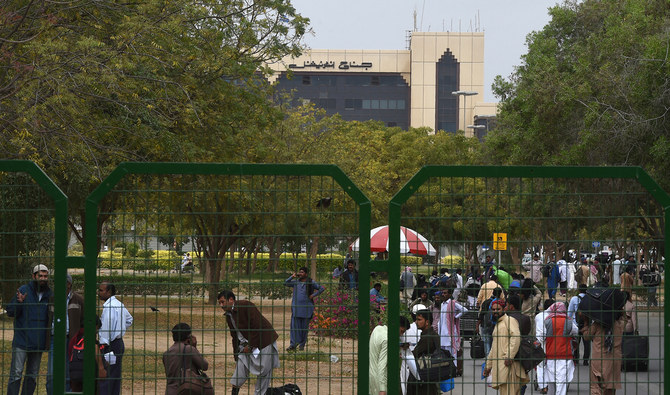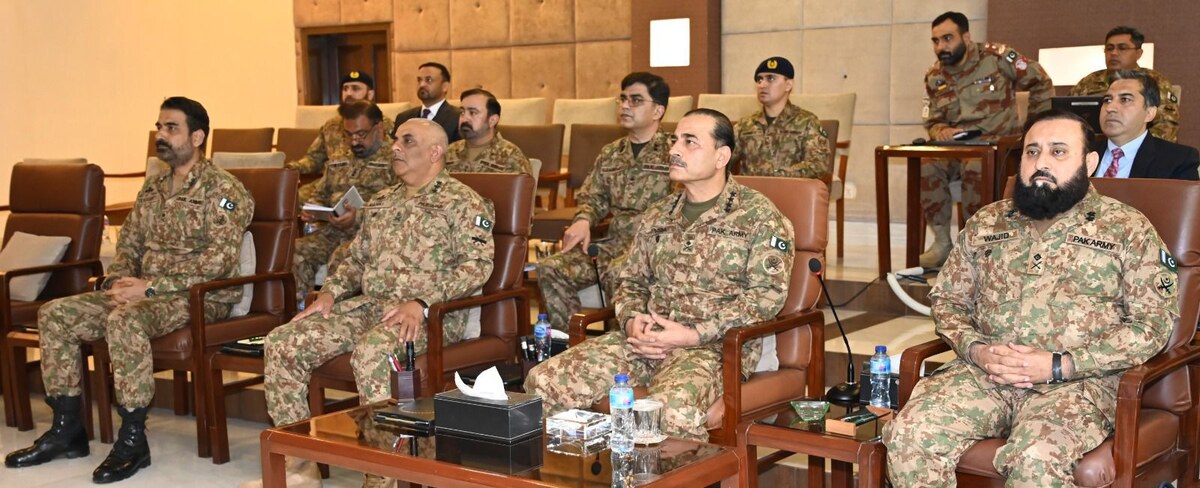ISLAMABAD: The Pakistan government has increased surveillance for the monkeypox virus at all international airports along with other entry points to the country since the World Health Organization (WHO) declared the outbreak a global health emergency on July 23, a spokesperson for the health ministry said this week, confirming that no case of the viral disease has been reported yet in the South Asian nation.
Until this year, the viral disease had rarely spread outside Africa where it is endemic. But reports of a handful of cases in the United Kingdom in early May signalled that the outbreak had moved into Europe.
The WHO said late last month 78 countries had reported more than 18,000 cases of monkeypox, the majority in Europe. India confirmed its first monkeypox death on Monday this week, a young man in the southern state of Kerala, in what is only the fourth known fatality from the disease in the current outbreak.
Human-to-human transmission of the virus happens through contact with bodily fluids, lesions on the skin or on internal mucosal surfaces, such as in the mouth or throat, respiratory droplets and contaminated objects.
“We have already alerted all the airports to screen inbound passengers according to the WHO guidelines regarding monkeypox, especially from Africa and other countries where disease has been reported,” health ministry spokesperson, Sajid Hussain Shah, told Arab News.
National and provincial health authorities, he said, had been advised to remain vigilant of any suspected cases.
“There is no case of monkeypox reported in Pakistan and the health ministry is continuously monitoring the situation,” Shah added.
The government has also directed the primary coronavirus response body, the National Command and Operation Center (NCOC), to monitor monkeypox along with COVID-19, the spokesperson said, adding that health teams checking for the coronavirus at airports were also now monitoring passengers for monkeypox.
“If they have any suspicion, then further tests were also conducted on that particular individual by isolating him as per standard procedure,” Shah said.
Officials said Pakistan’s disease monitoring system had become “very robust” because of the coronavirus pandemic and staff were well trained to identify passengers with symptoms.
Pakistani infectious disease experts believe the risk to the general public from monkeypox is currently low as the disease is not transmitted through the respiratory system like COVID-19 is.
Dr. Bushra Jamil, a professor of medicine and infectious diseases at the Aga Khan University Hospital, said monkeypox usually spreads through physical contact and would thus have less impact on the general public.
“There are chances that it will eventually come to Pakistan as well but we do not expect its spread to be as wide and deadly as COVID-19,” she told Arab News.
Another infectious disease expert, Dr. Javaid Usman, said detecting monkeypox through common symptoms would be a difficult task, as it spreads primarily via intimate skin-to-skin contact, usually with someone who has an active rash, as well as via contact with contaminated clothes or bedding. It is not as easily transmitted as the SARS-CoV-2 virus that spurred the COVID-19 pandemic, the doctor added.
“It is very difficult to detect monkeypox as it is not like COVID-19 that you can easily detect a sick person with fever or flu or cough like symptoms,” he said, adding that the basic symptoms of monkeypox disease were pox with pus, which in the early stage appeared in the genital areas of the infected person.
“We can call them pus-filled lesions. At a later stage these lesions could appear on hands or other parts of the body,” Usman said. “Primarily, it is a sexually transmitted infection which could extend to other modes of transmission for example bed linens, direct contact or large droplets.”
The WHO has so far not declared any vaccine fit for the monkeypox, Usman said.
Danish biotechnology company Bavarian Nordic said last Monday the European Commission had given permission for its Imvanex vaccine to be marketed as protection against monkeypox, as recommended last week by the European Medicines Agency.
“The availability of an approved vaccine can significantly improve nations’ readiness to fight emerging diseases, but only through investments and structured planning of the biological preparedness,” Bavarian Chief Executive Paul Chaplin said.
Bavarian’s vaccine, the only one to have won approval for the prevention of monkeypox disease in the United States and Canada, has in the EU so far only been approved to treat smallpox.
But the company has supplied the vaccine to several EU countries during the current monkeypox outbreak for what is known as “off-label” use.























